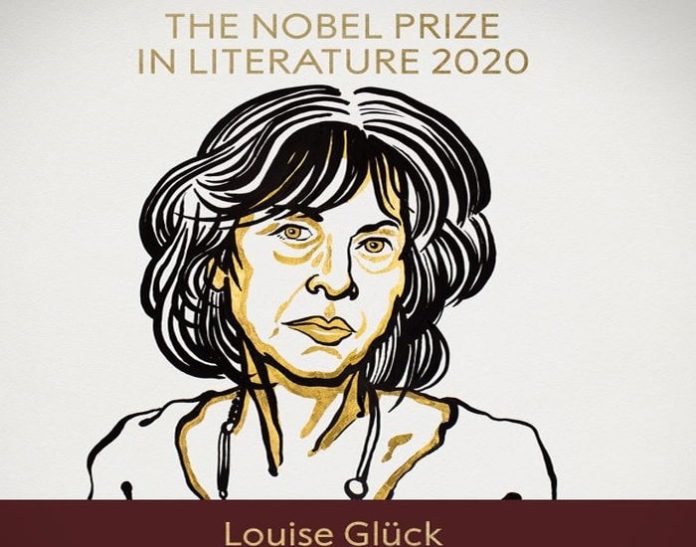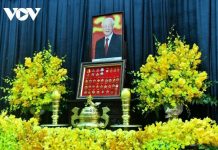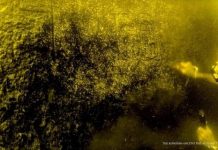Diễn từ nhận Nobel Văn học 2020 của Louise Glück
Louise Glück nói về ý nghĩa “riêng tư, thân mật” của thi ca và “nỗi sợ” khi nhận giải Nobel Văn học 2020, trong diễn từ hôm 7/12.
Khi còn là một đứa trẻ khoảng năm hay sáu tuổi gì đó, tôi tự biên tự diễn một cuộc thi trong đầu, để quyết định bài thơ nào hay nhất thế giới. Có hai tác phẩm vào chung kết – The Little Black Boy của William Blake và Swanee River của Stephen Foster. Đi đi đi lại lại trong phòng ngủ nhà bà mình ở Cedarhurst, một ngôi làng ở bờ nam Long Island, tôi thích lẩm nhẩm trong đầu những bài thơ không thể quên của Blake hơn là đọc ra miệng, và tôi hát, cũng từ trong tâm trí, khúc hát ám ảnh, hoang vắng của Foster. Việc tôi tìm đọc Blake thật kỳ bí. Tôi nghĩ một tập thơ của ông đã lạc giữa những cuốn sách chính trị, lịch sử và tiểu thuyết của bố mẹ. Nhưng tôi nghĩ tôi đã đọc sách của ông ở nhà bà. Bà tôi không phải người mê sách. Nhưng bà có cuốn The Songs of Innocence and of Experience và vài cuốn sách nhỏ in bài hát trong các vở kịch của Shakespeare, nhiều bài trong số đó tôi đã thuộc lòng. Tôi đặc biệt yêu thích khúc hát trong vở kịch Cymbeline, dù chẳng hiểu từ nào, tôi thích nghe giai điệu, âm thanh, những câu mệnh lệnh, chúng kích thích một đứa trẻ rụt rè và hay sợ hãi. “Và mộ các ngươi sẽ được nổi tiếng”. Tôi đã hy vọng thế.
Những cuộc thi kiểu này, vì danh dự, vì phần thưởng lớn lao, dường như là lẽ tự nhiên với tôi; những huyền thoại đầu tiên mà tôi đọc có đủ những điều đó. Từ khi tôi còn nhỏ, bài thơ vĩ đại nhất thế giới với tôi dường như là bài thơ có sự vinh danh lớn lao nhất. Đây cũng là cách tôi và em gái mình được nuôi dạy, để cứu nước Pháp như Joan of Arc, để khám phá ra chất phóng xạ như Marie Curie. Sau này, tôi bắt đầu hiểu những nguy hiểm và hạn chế của tư duy thứ bậc, nhưng trong thời thơ ấu của tôi, việc trao giải vô cùng quan trọng. Một người đứng trên đỉnh núi có thể được nhìn thấy từ rất xa, họ là thứ duy nhất đáng chú ý trên núi. Những người ở dưới thấp hơn thì như thể vô hình.
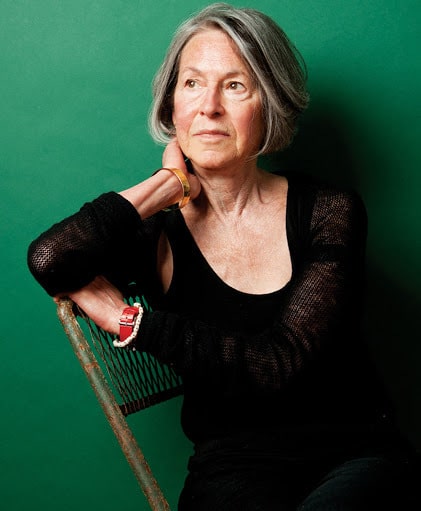
Louise Glück sinh năm 1943 ở New York, là tác giả của 12 tuyển tập thơ, một tiểu luận về thi ca. Bà là chủ nhân giải Nobel Văn học 2020. Ảnh: Pw.
Hoặc, trong trường hợp này, là bài thơ. Tôi cảm thấy chắc chắn rằng Blake đặc biệt biết đến cuộc thi của tôi, quan tâm đến kết quả của nó. Tôi hiểu ông đã chết, nhưng tôi cảm thấy ông vẫn còn đâu đây, tôi nghe thấy giọng nói của ông, dù nó đã được nguỵ trang, đích thị là ông. Tiếng nói ấy, tôi cảm thấy chỉ dành cho tôi, đặc biệt cho tôi. Tôi nghĩ mình là người được chọn để hưởng đặc ân này; tôi cũng cảm thấy Blake là người mà tôi khao khát được trò chuyện, cùng Shakespeare, người tôi từng đối thoại.
Blake là người chiến thắng cuộc thi. Nhưng sau này tôi đã nhận ra điểm giống nhau giữa hai bài thơ trữ tình đó; trong quá khứ và hiện tại, tôi bị cuốn vào giọng nói đơn độc của con người, cất lên giữa những khát khao, nuối tiếc. Và các nhà thơ tôi quay lại đọc khi lớn lên là những người mà tôi, một người nghe được chọn, được đóng một vai trò quan trọng trong tác phẩm của họ. Họ không nói với đám đông. Không nói với chính mình.
Tôi thích thỏa thuận này, thích cảm giác tin rằng những gì bài thơ truyền tải thật thiết thực và riêng tư, thông điệp được một linh mục hay nhà phân tích đều tiếp nhận.
Lễ trao giải trong phòng ngủ phụ nhà bà tôi, dường như sự bí ẩn của nó đã mở rộng mối quan hệ mãnh liệt mà một bài thơ tạo ra: mở rộng, chứ không phải xâm phạm.
Blake đã nói với tôi về cậu bé da đen bé nhỏ, ông là nguồn gốc của giọng nói bí ẩn đó. Ông không thể hiện hình, cậu bé da đen cũng không thể bị nhìn thấy, hoặc bị nhìn nhận một cách hời hợt bởi cậu bé da trắng thiếu nhạy cảm và khinh người. Nhưng tôi biết điều ông nói là đúng, rằng tấm thân phàm trần của ông chứa một linh hồn thuần khiết rực rỡ; tôi biết qua điều mà cậu bé da đen nói, lời kể của cậu về cảm xúc, những trải nghiệm của cậu, không có sự oán trách, không khao khát trả thù, chỉ có niềm tin rằng, trong thế giới hoàn hảo mà cậu được hứa hẹn sẽ đến sau khi chết, cậu sẽ được công nhận như chính con người mình. Và trong niềm vui sướng dâng trào, cậu nhắn nhủ hãy bảo vệ đứa trẻ da trắng khỏi những tia sáng chói lọi đột ngột. Đây không phải một hy vọng thực tế, nó đã bỏ qua những điều thực tế, khiến bài thơ trở nên chua xót và mang thông điệp chính trị sâu sắc. Sự tổn thương và nỗi uất hận chính đáng mà cậu bé da đen không cho phép mình cảm nhận, sự che chở của mẹ cậu, đã tác động đến người đọc. Kể cả khi độc giả đó chỉ là trê con.
Nhưng việc được công chúng tôn vinh lại là chuyện khác.
Những bài thơ mà tôi tâm huyết suốt đời thuộc kiểu tôi đã miêu tả, chúng có mối liên kết thân mật với người nghe hoặc người đọc – họ nhận mọi tâm sự, những tiếng than thở và đồng cảm. “Tôi chẳng là ai!”, Emily Dickinson nói. “Em cũng chẳng là ai/ Chúng ta là một đôi – đừng nói nhé!”. Hay Eliot: “Hãy cùng bỏ đi, anh và em/ Khi bóng đêm lan trên vòm trời/ Như gã bệnh nhân nằm trên bàn cấp cứu”. Eliot không triệu tập một đội hướng đạo sinh. Ông đang đòi hỏi điều gì đó từ độc giả. Ngược lại, trong câu thơ, “Liệu tôi có thể sánh em với một ngày hè?” của Shakespeare, ông không đang so sánh tôi với “ngày hè”. Tôi được phép nghe lỏm chúng, dù bài thơ không đòi hỏi có sự hiện diện của tôi.
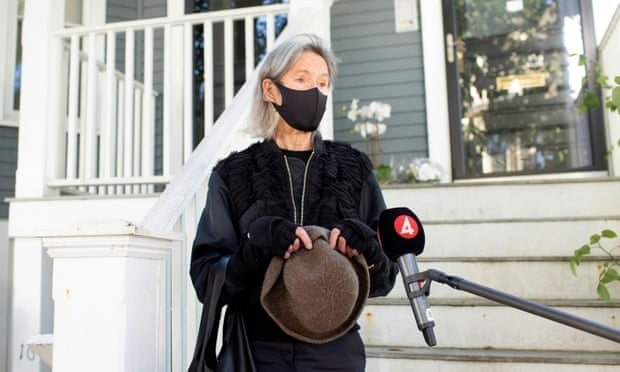
Louise Glück trả lời báo chí sau khi chiến thắng giải Nobel Văn học tại nhà riêng ở Massachusetts (Mỹ). Bà sẽ xuất bản tác phẩm mới vào mùa thu năm sau.Ảnh: Reuters.
Trong những tác phẩm tôi bị thu hút, tiếng nói, sự phán xét của đám đông vô cùng nguy hiểm. Những câu đối thoại thân mật làm gia tăng sức mạnh mong manh của nó và tiếp thêm nghị lực cho người đọc, những người lắng nghe được lời khẩn cầu, tâm sự bức bách ẩn trong đó.
Chuyện gì sẽ xảy ra với một nhà thơ kiểu này khi công chúng hoan nghênh và đề cao họ, thay vì chê bai hoặc phớt lờ. Tôi cho rằng họ sẽ cảm thấy bị đe dọa, áp đảo.
Đây là chủ đề Dickinson thường đề cập, không dày đặc, nhưng khá thường xuyên.
Tôi đọc Emily Dickinson say sưa nhất là hồi thiếu niên, thường là lúc đêm muộn, sau giờ đi ngủ, trên sofa phòng khách.
“I’m nobody! Who are you?
Are you nobody, too?”
(Tôi chẳng là ai! Em là ai?
Phải chăng em cũng chẳng là ai?)
Và, trong bản tôi đọc khi ấy, tôi thích nhất câu:
“Then there’s a pair of us – don’t tell!
They’d banish us, you know…”
(Vậy chúng ta là một đôi – đừng nói ra nhé
Họ sẽ lưu đày chúng ta, em biết không…)
Dickinson đã chọn tôi, hoặc nhận ra tôi, khi tôi ngồi đó trên sofa. Chúng tôi là một tinh hoa, những người bạn đồng hành vô hình, sự thật này chỉ chúng tôi biết, và mỗi bên lại chứng thực cho người kia. Trong thế giới này, chúng tôi chẳng là ai.
Nhưng điều gì sẽ tạo nên sự lưu đày đối với những người tồn tại như chúng tôi, trong nơi an toàn của mình, dưới một khúc gỗ? Sự lưu đày là khi khúc gỗ bị nhấc đi.
Ở đây, tôi không nói về tác động xấu của Emily Dickinson với các cô gái tuổi teen. Tôi đang nói về việc không tin tưởng vào cuộc sống đám đông hoặc coi đó là cõi mà sự khái quát làm lu mờ sự chính xác, và sự thật luôn bị giấu diếm. Ví dụ: nếu giọng nói của Dickinson bị thay thế bởi giọng quan tòa: “Chúng tôi chẳng là ai cả, anh là ai?”. Thông điệp bỗng trở nên nguy hiểm.
Thật bất ngờ, ngày 8/10 (ngày trao giải Nobel Văn học), tôi đã cảm thấy hoảng loạn như tôi từng miêu tả. Hào quang chói lóa. Tầm vóc lớn lao.
Nhiều người viết mong muốn tiếp cận nhiều độc giả. Nhưng một số nhà thơ không đề cao sự tiếp cận về mặt không gian, chẳng hạn như các căn phòng chật kín người. Họ đặt mục tiêu đạt được nhiều thứ theo tuần tự thời gian, ở thì tương lai, theo một cách sâu xa, những độc giả sẽ đến, lần lượt từng người một.
Tôi tin rằng khi trao cho tôi giải thưởng này, Viện Hàn lâm Thụy Điển đã chọn tôn vinh giọng nói thân mật, riêng tư, mà công chúng đôi khi có thể cùng góp lời để tăng thêm hoặc mở rộng, nhưng không bao giờ có thể thay thế.
Hà Thu (theo: Nobelprize)
Louise Glück: Nobel Lecture
When I was a small child of, I think, about five or six, I staged a competition in my head, a contest to decide the greatest poem in the world. There were two finalists: Blake’s “The Little Black Boy” and Stephen Foster’s “Swanee River.” I paced up and down the second bedroom in my grandmother’s house in Cedarhurst, a village on the south shore of Long Island, reciting, in my head as I preferred, not from my mouth, Blake’s unforgettable poem, and singing, also in my head, the haunting, desolate Foster song. How I came to have read Blake is a mystery. I think there were a few poetry anthologies in my parents’ house among the more common books on politics and history and the many novels. But I associate Blake with my grandmother’s house. My grandmother was not a bookish woman. But there was Blake,The Songs of Innocence and of Experience, and also a tiny book of the songs from Shakespeare’s plays, many of which I memorized. I particularly loved the song fromCymbeline, understanding probably not a word but hearing the tone, the cadences, the ringing imperatives, thrilling to a very timid, fearful child. “And renownèd be thy grave.” I hoped so.
Competitions of this sort, for honor, for high reward, seemed natural to me; the myths that were my first reading were filled with them. The greatest poem in the world seemed to me, even when I was very young, the highest of high honors. This was also the way my sister and I were being raised, to save France (Joan of Arc), to discover radium (Marie Curie). Later I began to understand the dangers and limitations of hierarchical thinking, but in my childhood it seemed important to confer a prize. One person would stand at the top of the mountain, visible from far away, the only thing of interest on the mountain. The person a little below was invisible.
Or, in this case, poem. I felt sure that Blake especially was somehow aware of this event, intent on its outcome. I understood he was dead, but I felt he was still alive, since I could hear his voice speaking to me, disguised, but his voice. Speaking, I felt, only to me or especially to me. I felt singled out, privileged; I felt also that it was Blake to whom I aspired to speak, to whom, along with Shakespeare, I was already speaking.
Blake was the winner of the competition. But I realized later how similar these two lyrics were; I was drawn, then as now, to the solitary human voice, raised in lament or longing. And the poets I returned to as I grew older were the poets in whose work I played, as the elected listener, a crucial role. Intimate, seductive, often furtive or clandestine. Not stadium poets. Not poets talking to themselves.
I liked this pact, I liked the sense that what the poem spoke was essential and also private, the message received by the priest or the analyst.
The prize ceremony in my grandmother’s second bedroom seemed, by virtue of its secrecy, an extension of the intense relation the poem had created: an extension, not a violation.
Blake was speaking to me through the little black boy; he was the hidden origin of that voice. He could not be seen, just as the little black boy was not seen, or was seen inaccurately, by the unperceptive and disdainful white boy. But I knew that what he said was true, that his provisional mortal body contained a soul of luminous purity; I knew this because what the black child says, his account of his feelings and his experience, contains no blame, no wish to revenge himself, only the belief that, in the perfect world he has been promised after death, he will be recognized for what he is, and in a surfeit of joy protect the more fragile white child from the sudden surfeit of light. That this is not a realistic hope, that it ignores the real, makes the poem heartbreaking and also deeply political. The hurt and righteous anger the little black boy cannot allow himself to feel, that his mother tries to shield him from, is felt by the reader or listener. Even when that reader is a child.
But public honor is another matter.
The poems to which I have, all my life, been most ardently drawn are poems of the kind I have described, poems of intimate selection or collusion, poems to which the listener or reader makes an essential contribution, as recipient of a confidence or an outcry, sometimes as co-conspirator. “I’m nobody,” Dickinson says. “Are you nobody, too? / Then there’s a pair of us — don’t tell…” Or Eliot: “Let us go then, you and I, / When the evening is spread out against the sky / Like a patient etherised upon a table…” Eliot is not summoning the boyscout troop. He is asking something of the reader. As opposed, say, to Shakespeare’s “Shall I compare thee to a summer’s day”: Shakespeare is not comparing me to a summer’s day. I am being allowed to overhear dazzling virtuosity, but the poem does not require my presence.
In art of the kind to which I was drawn, the voice or judgment of the collective is dangerous. The precariousness of intimate speech adds to its power and the power of the reader, through whose agency the voice is encouraged in its urgent plea or confidence.
What happens to a poet of this type when the collective, instead of apparently exiling or ignoring him or her, applauds and elevates? I would say such a poet would feel threatened, outmaneuvered.
This is Dickinson’s subject. Not always, but often.
I read Emily Dickinson most passionately when I was in my teens. Usually late at night, post-bedtime, on the living room sofa.
I’m nobody! Who are you?
Are you nobody, too?
And, in the version I read then and still prefer:
Then there’s a pair of us — don’t tell!
They’d banish us, you know…
Dickinson had chosen me, or recognized me, as I sat there on the sofa. We were an elite, companions in invisibility, a fact known only to us, which each corroborated for the other. In the world, we were nobody.
But what would constitute banishment to people existing as we did, in our safe place under the log? Banishment is when the log is moved.
I am not talking here about the pernicious influence of Emily Dickinson on teenaged girls. I am talking about a temperament that distrusts public life or sees it as the realm in which generalization obliterates precision, and partial truth replaces candor and charged disclosure. By way of illustration: suppose the voice of the conspirator, Dickinson’s voice, is replaced by the voice of the tribunal. “We’re nobody, who are you?” That message becomes suddenly sinister.
It was a surprise to me on the morning of October 8thto feel the sort of panic I have been describing. The light was too bright. The scale too vast.
Those of us who write books presumably wish to reach many. But some poets do not see reaching many in spatial terms, as in the filled auditorium. They see reaching many temporally, sequentially, many over time, into the future, but in some profound way these readers always come singly, one by one.
I believe that in awarding me this prize, the Swedish Academy is choosing to honor the intimate, private voice, which public utterance can sometimes augment or extend, but never replace.
The Little Black Boy
By William Blake
My mother bore me in the southern wild,
And I am black, but O! my soul is white;
White as an angel is the English child,
But I am black, as if bereav’d of light.
My mother taught me underneath a tree,
And sitting down before the heat of day,
She took me on her lap and kissed me,
And pointing to the east, began to say:
“Look on the rising sun: there God does live,
“And gives his light, and gives his heat away;
“And flowers and trees and beasts and men receive
“Comfort in morning, joy in the noonday.
“And we are put on earth a little space,
“That we may learn to bear the beams of love;
“And these black bodies and this sunburnt face
“Is but a cloud, and like a shady grove.
“For when our souls have learn’d the heat to bear,
“The cloud will vanish; we shall hear his voice,
“Saying: ‘Come out from the grove, my love & care,
“‘And round my golden tent like lambs rejoice.’”
Thus did my mother say, and kissed me;
And thus I say to little English boy:
When I from black and he from white cloud free,
And round the tent of God like lambs we joy,
I’ll shade him from the heat, till he can bear
To lean in joy upon our father’s knee;
And then I’ll stand and stroke his silver hair,
And be like him, and he will then love me.
“I’m nobody! Who are you?”
By Emily Dickinson
I’m nobody! Who are you?
Are you nobody, too?
Then there’s a pair of us — don’t tell!
They’d banish us, you know.
How dreary to be somebody!
How public, like a frog
To tell your name the livelong day
To an admiring bog!
* “The Little Black Boy” from Songs of Innocence and of Experienceby William Blake.Poetry and Prose of William Blake/ edited by Geoffrey Keynes. London : Nonesuch, 1927.
* “Old Folks at Home” / “Way Down Upon the Swanee River”, 1851. Words and music by Stephen Foster.
* “Fear No More the Heat o’ the Sun” fromCymbeline(Act IV, Scene II) by William Shakespeare.
* “I’m Nobody! Who are you?” by Emily Dickinson.The Poems of Emily Dickinson. Edited by Martha Dickinson Bianchi and Alfred Leete Hampson. London : Jonathan Cape, 1937.
* “The Love Song of J. Alfred Prufrock” by T. S. Eliot.Collected Poems 1909 – 1962. London : Faber & Faber, 1963.
* Sonnet XVIII: “Shall I compare thee to a summer’s day” by William Shakespeare.
Louise Glück – Nobel Lecture. NobelPrize.org



